- Home
- Joseph Bruchac
The Return of Skeleton Man Page 5
The Return of Skeleton Man Read online
Page 5
“Quiet morning, girls?” he asked.
“Unh-huh,” I said.
Mom just nodded, and she squeezed Dad’s hand under the table most of the time we were eating. Then Mom and I went to an early afternoon chamber music concert in the Lake Lounge.
To the outside world, we’ve been acting as if we don’t have a care in the world, but it’s just an act. If we are being watched, we don’t want to make it look like we’re suspicious.
And now it is time for us to do part of what we’d planned. Mom pulls out the Historical Features of the Mountain House booklet that we just bought at the gift shop.
“Well, we have a couple of hours before afternoon tea. Shall we do that self-guided tour, honey?” she asks.
She sounds like she is reading bad dialogue from a second-rate movie. That is one problem with having made a plan. Spontaneity is hard to fake. And my response to her, despite myself, is just as bright and stiff.
“Sure, Mom, that sounds like a great idea.”
We take a look at the map inside the booklet. We actually have already spent time studying it. It shows the five huge interconnected wings that make up the Mountain House. Rock Building, Stone Building, Central Building, Grove Building, and the Kitchen and Dining Room Building.
“Oh,” Mom says, with the inflection of a bad high school understudy trying to remember her lines now that the lead actress has come down with the flu, “there’s our friend. ¿Cómo está usted?”
“Bien, gracias,” Corazón answers. Thankfully, her voice is not at all strained. It helps Mom and me to relax. What helps even more is when, as she gives each of us a hug, she whispers, “Don’t worry” in our ears.
Our accidental meeting is no accident. After dinner we had found Corazón and asked her to help us. So she’s arranged to have this afternoon off to walk the corridors with us. Corazón, who has worked here for almost a year, is going to point out things that most tourists would not care about or need to know.
The three of us just look like friends strolling along, talking and laughing. But inside, Mom and I are not just being tourists. We’re doing what my dad used to do when he was a star lacrosse player. Before each match he would walk the field to familiarize himself with every inch of the place where the game would be played.
And as we do this, as Corazón whispers things to us like where keys are kept and what the hidden ways are in this huge old maze of a place, that feeling from yesterday comes back again. It’s like walking into a darkened room, right into a spiderweb that you don’t see until it brushes across your face and sticks there.
11
Snow
We’ve made it through the day. Dad and Mom and I are sitting at our favorite table by the window. Nothing strange has happened except for the snow. A freak storm has swept in from the west and is dumping more snow than I have ever seen in October. From what the forecasters say, it is falling mostly here in the mountains. Down in the valley below, there is hardly any snow at all, and in some cases there is just cold rain.
Snow. All kinds of thoughts are going through my head. Memories of making snowballs, and snow angels and snowmen, and forts. Up on the Rez, snow always means it is time to lay down boards on the back lawn and turn on the hose to make an instant hockey rink. Even though I didn’t grow up on the Rez, Dad has made sure I’ve always had my own skates, and I can swing a stick as well as any boy. When we go up there in the winter, I have my skates and pads, ready to take on my cousins in one of our knock-’em-down, drag-’em-out pick-up games. Lots of scoring and bloody noses. I’m good enough so that I am usually one of the first three or four picked for a side. There’s such a feeling of freedom when you can just glide over the ice as if you are flying—and then bodycheck someone so that he flies head over heels into one of the snowdrifts around the rink and steal the puck from him.
There are also Mohawk stories involving snow. Terrible giants sometimes show up in the stories my dad tells. Their skins and their hearts are made of ice and they have no human feelings, just a hunger that can never be satisfied.
The snow swirls across the window. This is ice-giant weather for sure. The waiter stops by our table.
“I know you folks said you weren’t planning on going anywhere,” he says, “but I thought I should let you know that this storm has gotten pretty bad.” He looks out the window and shakes his head. “We don’t get anything like this in the Dominican Republic. Anyhow, they’ve closed the road down the mountain. Nobody will be getting out of here tonight.”
Nobody will be getting out of here. Those few innocent words send a chill down my back.
While we wait for our food to come, we don’t talk. Instead, Dad and Mom and I just look out the window at the swirling patterns of snow. It is hard to see any shapes beyond the branches of the nearest trees. They still have autumn leaves and the snow is making their branches bend dangerously low to the ground, strained to the point of breaking. Weather like this knocks down not just branches but also power lines and phone lines and then you are cut off from the outside world. I don’t like the thought of that.
There could be almost anything out there hidden by that snow. There could be a huge hairy elephant, just like the one in that story by Rafe Martin called Will’s Mammoth. That used to be my favorite picture book when I was little. Or there could be a whole army of ice giants creeping up on us through the howling storm. I try to imagine them out there, those huge monsters from the old tales. Thinking of mammoths and ice giants is a lot safer than thinking about the one real monster that I escaped from. Imaginary monsters are nowhere near as scary. And the stories always end with you sitting safe and warm at home or around the fire in the longhouse.
But my thoughts won’t stay in that safe, fanciful place. Anything could be hidden by that snow. Anything.
12
Masks
The Day of the Dead party is being held in the Lake Lounge tonight. We have decided to be totally minimalist in what we’re wearing. No full-face masks hide our features. Just those little Lone Ranger masks. No weird alien outfits with extra limbs. We want to be able to see and recognize one another when we are in the crowd of people. Dad is dressed as a Mohawk high-steel construction worker. That was easy for him. He had thought ahead when he was packing and brought along his old work clothes, from his boots and coveralls to the hardhat with an eagle painted on it. He even has a big spanner wrench stuck in his belt.
Mom and I aren’t really wearing costumes. We never use the word costume to describe traditional clothing. What we have on is just that, the traditional buckskin dresses with beautiful beadwork that we wear to powwows. We hear appreciative remarks from people as we sweep by. The only risk is that someone will think Mom and I are supposed to be dressed as Pocahontas and her mother. No way. I am Molly Brant, warrior woman. And Mom is dressed as Jigonsaseh, the woman who helped the Peacemaker and Hiawatha found the great Iroquois League of Peace by being the first person to speak in favor of their idea.
The clothing we’re wearing is not just beautiful. It is also comfortable and practical, too. You can run in a buckskin dress. It doesn’t hold you back and restrict you like long dresses with petticoats and tight cinched-in waists. I see some of the girls going down the hall dressed in Cinderella costumes. If they got knocked over, it would be as hard for them to get up as it is for a turtle to get off its back.
Corazón is going to be here at the party, working. I close my eyes to imagine how she might look in traditional garb and I suddenly see her in my mind’s eye. She’s wearing a calf-length white dress decorated with beautiful embroidery in all the colors of the rainbow. A jaguar-skin robe is draped over her shoulders and in one hand is either a long knife or a short spear. She wears a crown made of colorful parrot feathers and long quetzal plumes. An intricate necklace made of gold hangs around her neck, jangling bracelets of gold and silver are on her wrists and ankles, and anklets of jaguar skin rest above her bare feet. There’s a glow about her as if she has been lit by some inner
light. I don’t know what traditional Mayan dress looks like, so I’m not sure where this picture in my mind has just come from. It puzzles me a little bit. What puzzles me even more is why that mental image of her seems to grow and come into clearer focus, so clear that I can see the gold shapes that are linked together in her bracelets and anklets and necklace, and I know what they really are. Each link is a tiny gold skull. And I recognize who she is. The Lady of the Dead.
Sí, I am the Lady, a voice whispers in my head. I greet you, my little sister.
I open my eyes and blink. That vision of Corazón is gone and I see her coming down the hallway toward us. Her work clothing is not at all exotic. She has on sensible white tennis shoes and a plain uniform dress, its only decoration the embroidered Mohonk Mountain House logo. Its gray color indicates that she is a member of the serving staff.
The clothes worn by the employees here have different colors and designs according to the different jobs they do. When we first arrived and Dad gave our car keys to the valet he had joked about that with the young man in the green shirt who took our car and the older man in the dark brown shirt who was clearly the younger man’s supervisor. “If I wore a purple shirt,” Dad said, “would that make me the king?” I guess that doesn’t sound so funny when I tell it, but the way my dad said it and the smile he gave them made everyone chuckle.
Corazón has obviously come out to greet us. We’ve just passed the Winter Lounge and the gift shop and have not yet made the left-hand turn that brings us to the Lake Lounge. We can hear the sound of music being played rather loudly.
“Buenas noches,” Corazón says. Then she looks back over her shoulder. “It is very crowded in there,” she says in a softer voice, “but I have not seen anyone who might be that person you are worried about. Even a costume cannot hide a man’s height.”
Dad nods. We have told Corazón about the man who abducted them and pretended to be my uncle. We described him as best we could, even though all three of us realized as we did so that it was hard to have a clear image of what he really looked like in our minds. And that is strange because we all have a good memory for faces. All we could remember was that he was far from being a young man, though he didn’t move as if he were elderly. He had a kind of energy about him that was intense. He was tall, tall enough to have been a basketball player, with long thin arms and legs and very big hands. There was something about him that looked Indian, but it was hard to define, as hard as it was to describe his features except to say that they were bony and skull-like.
Corazón is holding a serving tray out to us with small loaves of bread on it.
“Take one,” she says, “and bite into it. But do not bite hard, sí?”
Even though we ate only an hour ago, those little loaves look good to me. They are still warm from the oven. I bite into one and my teeth strike something. I reach into my mouth and pull it out. It is a small white plastic skeleton.
13
Darkness
Dad and Mom and I are in the Lake Lounge now. Just as Corazón said, it is packed with people. Except for the servers, everyone is in costume, both grown-ups and kids. Some are just wearing premolded masks that cover their heads. After all these years, it seems, Richard Nixon is still as popular as Dracula or the Wolf Man or Jason from Friday the 13th. But others are wearing really elaborate costumes. Because this is a blend of Halloween and the Mexican Day of the Dead, there are zombies and Zorros, witches and Spanish señoritas, robots and banditos. There’s been some research done. I see someone wearing a sign around her neck identifying her as La Llorona, the wailing woman of Mexican folklore. A handsome-looking man in conquistador garb and a woman whose knee-length dark hair has to be a wig are telling everyone within earshot that they are Hernando Cortés and La Malinche, the Indian woman who was his interpreter and ally during the conquest of Mexico.
I’m finding it all kind of amusing and confusing at the same time. In part that is because I am trying to stick like glue to my dad’s side and not let go of my mother’s hand. It is also because, like my parents, I keep scanning the crowd for a man who is a head taller than everyone else. And there’s a third reason for my feeling of disquiet.
It’s not what you think, though. It is not that little skeleton I found in my piece of bread. No, that wasn’t a mean trick played on me by Corazón. That special bread was what Mexican people call pan de muerto, or the bread of the dead. It is considered to be good luck to be the one who bites into the small toy skeleton hidden inside the loaf. The fact that the little loaves taken by my mother and father had nothing in them was a sign of how lucky I had been in choosing that piece. That little plastic skeleton was in my pocket now.
The reason I am feeling uneasy is hard to explain. I guess it started when I saw the first person in a skeleton costume. It wasn’t him. That person was way too short and the costume was just a body suit with skeletal bones painted on it. But it gave me a start.
I look back over my shoulder and catch the eye of Corazón, who has been moving about the room with her serving tray. She is acting as another set of eyes for us, helping us keep watch. She smiles and then shakes her head. She hasn’t seen anything for us to worry about. At least not yet. Still, I feel a sudden cold chill, as if a little of the early winter wind has just blown across my neck.
A feeling is growing inside me that something is very wrong, but I don’t know what it is. I turn to look out the window. Spotlights are shining on the new snow and everything is almost as clear as day. That’s encouraging. I’m not usually afraid of the dark, but tonight I don’t want to look out and see nothing but darkness, a darkness that might hide something that is coming closer with every hidden step. I’m glad it is brightly lit inside this room. Bright enough for me to see anything or anyone that might be a danger to us.
What a crazy thought. There’s no reason for me to be so uptight. But I don’t let go of my mom’s hand and I keep looking around. Then I see something that seems out of place—a person across the room, sitting in a chair near one of the doors that leads out onto the porch. His costume is weird. I can’t tell what he is supposed to be. He’s wearing a heavy coat, and a ski mask is covering most of his head. But he also has some kind of contraption on top of his head that looks like really complicated binoculars. He slowly lifts a long hand up to brush snow off his shoulder. He’s just come in from outside. It must have been when he slipped into the room that I felt that cold breeze on my neck. He looks in my direction, then reaches that long hand up to pull those binoculars down over his eyes like goggles. Is he supposed to be dressed as a space alien?
I squeeze my mom’s hand harder, pulling on it to turn her around to see what I’m seeing. She squeezes my hand back to reassure me but doesn’t turn. She’s leaning up to say something to my dad, who is also not paying attention to what I see. I reach for his belt with my other hand.
“Dad,” I try to whisper. But my throat is so dry and tight that all I can do is croak and he doesn’t hear me. He’s too busy listening to Mom.
The man with the binocular eyes is staring right at me. I can’t see his mouth under that ski mask, but I think he is grinning now. He waves his hand at me and then reaches into his coat pocket to pull out something that looks like a cell phone. Then he begins to stand up, unfolding himself from his chair, and I can see how thin he is, how very tall he is. I want to scream, but I can’t.
He holds that cell phone up and then, with his other hand, he presses the buttons. Once, twice…and there is the muffled sound of a distant explosion. The lights flicker and everything is plunged into total darkness.
14
Help
I can hear the sound of water dripping but I can’t see anything. I seem to be lying on the ground. My head is spinning and aches horribly. I try to lift my hands up to my forehead, but they seem to be caught behind my back. I struggle to free them and realize that my wrists are stuck together. How did this happen? I’m not thinking clearly. I try to remember and the effort is too much f
or me. I feel as if a hole is opening up underneath me and I’m slipping into it. Just before I drop back into an unconscious state I realize that my hands are tied and that I’ve been taken captive—and that I know who my captor is.
Help, I whisper, just before I fall into total darkness. Help me.
I open my eyes again. This time I can see. Whatever was covering my eyes is gone. So is the sound of dripping water. I don’t know where I was before, but I know it is not where I am now. I’m no longer afraid. Strange as it sounds, I feel peaceful. I’m somewhere down in the earth and there is gold all around me. I don’t mean the color gold. I mean real gold. The walls, the floor, even the ceiling of this place is made up of veins of pure gold.
But seeing it this way, I don’t feel like I’m looking at riches. I feel as if I am looking at the bones of Mother Earth, seeing them as they should be seen, hidden away. I remember reading about how some Mexican Indians believe that digging gold from the earth always hurts the land, that it is a source of strength when it remains where it is, that we humans were only meant to use whatever gold we find washed out to us in the streams. And that we should then use it only to make things of beauty, because it is a blessing.
“Little Sister,” a voice says from behind me, “I am glad that your heart understands this.”

 Peacemaker
Peacemaker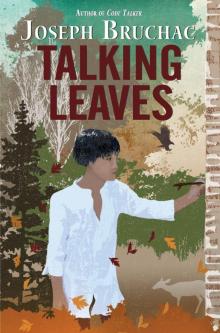 Talking Leaves
Talking Leaves Found
Found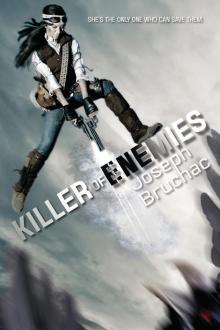 Killer of Enemies
Killer of Enemies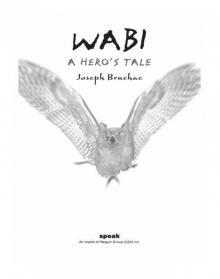 Wabi
Wabi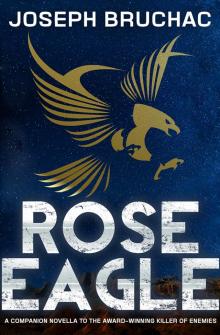 Rose Eagle
Rose Eagle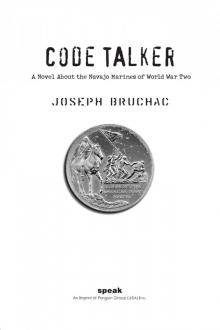 Code Talker
Code Talker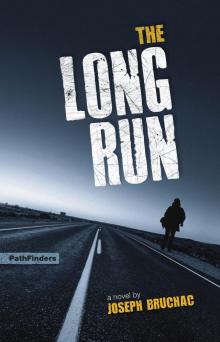 The Long Run
The Long Run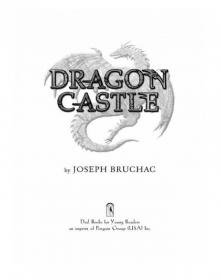 Dragon Castle
Dragon Castle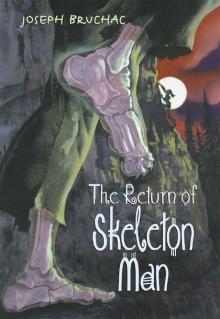 The Return of Skeleton Man
The Return of Skeleton Man Pocahontas
Pocahontas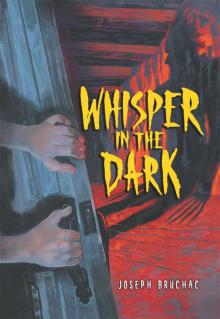 Whisper in the Dark
Whisper in the Dark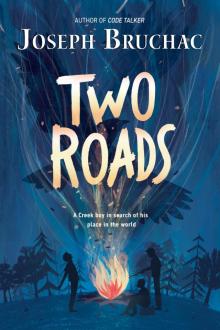 Two Roads
Two Roads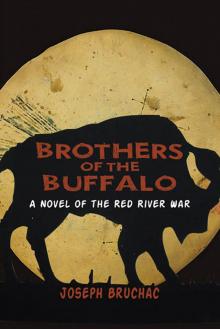 Brothers of the Buffalo
Brothers of the Buffalo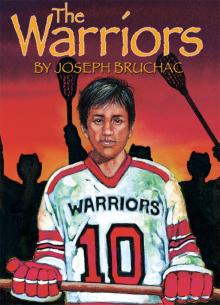 The Warriors
The Warriors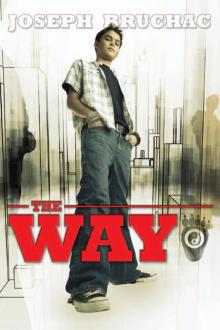 The Way
The Way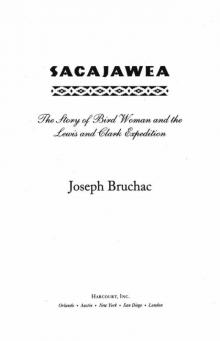 Sacajawea
Sacajawea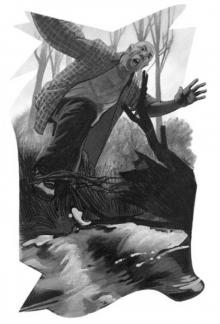 Night Wings
Night Wings March Toward the Thunder
March Toward the Thunder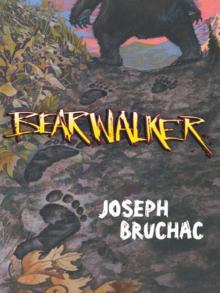 Bearwalker
Bearwalker Skeleton Man
Skeleton Man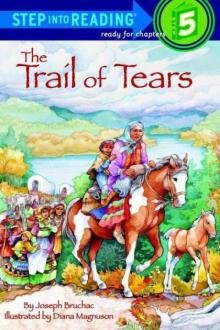 The Trail of Tears
The Trail of Tears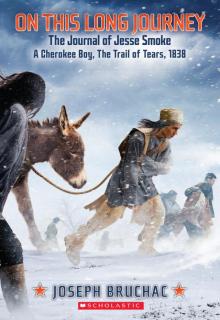 On This Long Journey
On This Long Journey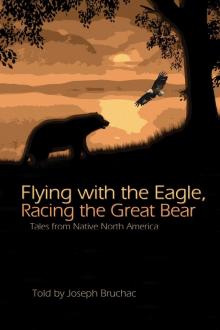 Flying with the Eagle, Racing the Great Bear
Flying with the Eagle, Racing the Great Bear